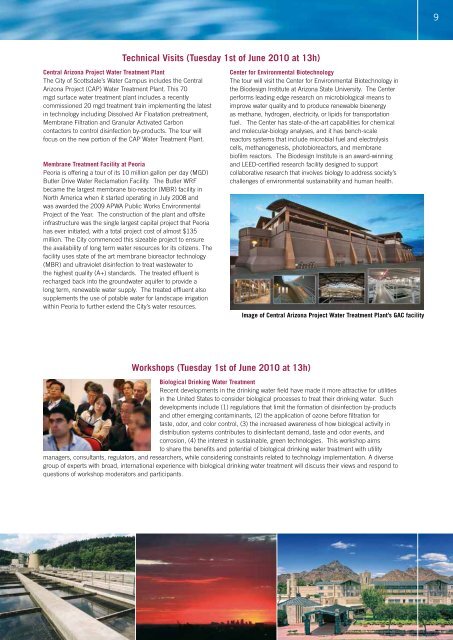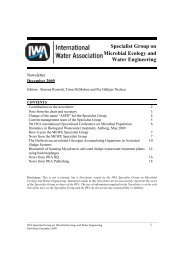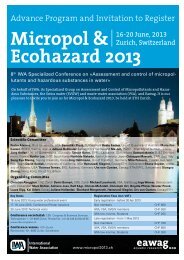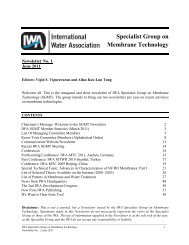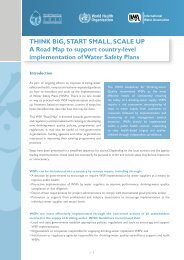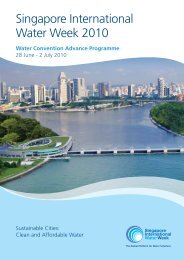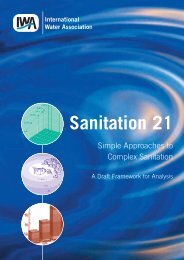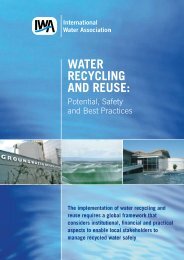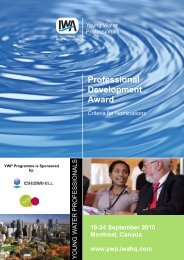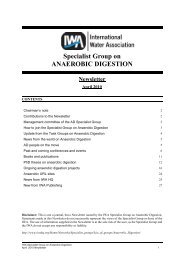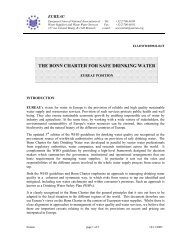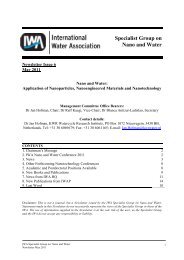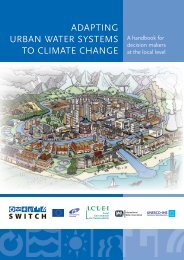2-4 June 2010 Arizona Biltmore Phoenix (AZ) - IWA
2-4 June 2010 Arizona Biltmore Phoenix (AZ) - IWA
2-4 June 2010 Arizona Biltmore Phoenix (AZ) - IWA
Create successful ePaper yourself
Turn your PDF publications into a flip-book with our unique Google optimized e-Paper software.
9<br />
Technical Visits (Tuesday 1st of <strong>June</strong> <strong>2010</strong> at 13h)<br />
Central <strong>Arizona</strong> Project Water Treatment Plant<br />
The City of Scottsdale’s Water Campus includes the Central<br />
<strong>Arizona</strong> Project (CAP) Water Treatment Plant. This 70<br />
mgd surface water treatment plant includes a recently<br />
commissioned 20 mgd treatment train implementing the latest<br />
in technology including Dissolved Air Floatation pretreatment,<br />
Membrane Filtration and Granular Activated Carbon<br />
contactors to control disinfection by-products. The tour will<br />
focus on the new portion of the CAP Water Treatment Plant.<br />
Membrane Treatment Facility at Peoria<br />
Peoria is offering a tour of its 10 million gallon per day (MGD)<br />
Butler Drive Water Reclamation Facility. The Butler WRF<br />
became the largest membrane bio-reactor (MBR) facility in<br />
North America when it started operating in July 2008 and<br />
was awarded the 2009 APWA Public Works Environmental<br />
Project of the Year. The construction of the plant and offsite<br />
infrastructure was the single largest capital project that Peoria<br />
has ever initiated, with a total project cost of almost $135<br />
million. The City commenced this sizeable project to ensure<br />
the availability of long term water resources for its citizens. The<br />
facility uses state of the art membrane bioreactor technology<br />
(MBR) and ultraviolet disinfection to treat wastewater to<br />
the highest quality (A+) standards. The treated effluent is<br />
recharged back into the groundwater aquifer to provide a<br />
long term, renewable water supply. The treated effluent also<br />
supplements the use of potable water for landscape irrigation<br />
within Peoria to further extend the City’s water resources.<br />
Center for Environmental Biotechnology<br />
The tour will visit the Center for Environmental Biotechnology in<br />
the Biodesign Institute at <strong>Arizona</strong> State University. The Center<br />
performs leading edge research on microbiological means to<br />
improve water quality and to produce renewable bioenergy<br />
as methane, hydrogen, electricity, or lipids for transportation<br />
fuel. The Center has state-of-the-art capabilities for chemical<br />
and molecular-biology analyses, and it has bench-scale<br />
reactors systems that include microbial fuel and electrolysis<br />
cells, methanogenesis, photobioreactors, and membrane<br />
biofilm reactors. The Biodesign Institute is an award-winning<br />
and LEED-certified research facility designed to support<br />
collaborative research that involves biology to address society’s<br />
challenges of environmental sustainability and human health.<br />
Image of Central <strong>Arizona</strong> Project Water Treatment Plant’s GAC facility<br />
Workshops (Tuesday 1st of <strong>June</strong> <strong>2010</strong> at 13h)<br />
Biological Drinking Water Treatment<br />
Recent developments in the drinking water field have made it more attractive for utilities<br />
in the United States to consider biological processes to treat their drinking water. Such<br />
developments include (1) regulations that limit the formation of disinfection by-products<br />
and other emerging contaminants, (2) the application of ozone before filtration for<br />
taste, odor, and color control, (3) the increased awareness of how biological activity in<br />
distribution systems contributes to disinfectant demand, taste and odor events, and<br />
corrosion, (4) the interest in sustainable, green technologies. This workshop aims<br />
to share the benefits and potential of biological drinking water treatment with utility<br />
managers, consultants, regulators, and researchers, while considering constraints related to technology implementation. A diverse<br />
group of experts with broad, international experience with biological drinking water treatment will discuss their views and respond to<br />
questions of workshop moderators and participants.


